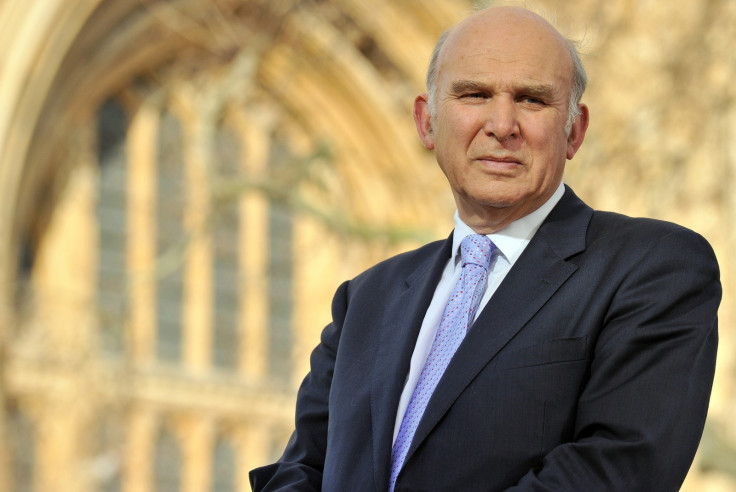Vince Cable interview: Meet the ex-business secretary hoping to become Lib Dem leader
Cable spoke with IBTimes UK about his leadership bid, Brexit, the election and his time in office.
With populism pumping into ballot boxes across the West, Sir Vince Cable, 74, wants to put economic credibility at the heart of the Liberal Democrats' offering to the British public. The former business secretary, in a wide-ranging interview with IBTimes UK, argued that the electorate are "desperate" for such a centre-left, pro-capitalist party.
"We're in a difficult position in the country at the moment because the Conservatives have got themselves into a terrible mess," he said.
"The Labour Party have done brilliantly well in this election with Jeremy Corbyn, all credit to him. But they don't have any economic credibility at all, really. Two plus two equals seven is not a sensible basis for talking about public money.
"I would be very surprised if a lot of the people who jumped on the Labour bandwagon seriously see the current Labour Party as a party of government. When that issue is posed, they will be looking for somebody and a party that is."
Cable plans to complement this pro-mixed economy message with a socially progressive agenda, while seeking to keep the UK "as close as possible" to the EU. "To keep the essentials of the single-market and the customs union," he said.
The Liberal Democrat grandee, who boasts of enhanced energy after winning back his Twickenham seat at the general election, wants to have second a EU referendum on the terms of Britain's divorce from the bloc.
His message is similar to that of Tim Farron, the outgoing Liberal Democrat leader who said it was "impossible" for him to stay in the top job and maintain his evangelical Christian faith.
Under Farron, the Liberal Democrats targeted the 48% of Remain voters from the EU referendum. The strategy saw the party gain four extra seats – the Liberal Democrats now have 12 MPs – but their vote share fell to 7.4%, down 0.5% on 2015. So what did Farron do wrong?
"I respect Tim's convictions and how he dealt with it, but he wasn't really given a proper hearing in the election. He wasn't seen seen as an alternative prime minister, I plausibly could be," Cable said.
"I think that does make a big difference in the terms of voting. In terms of overall party support, it is winning the air war as opposed to the ground war. I would be well qualified to take on the air war."
Cable, who is expected to face a challenge from another knight of the realm, the former energy secretary Sir Ed Davey, is also putting his "vast amount of experience" inside of government and on the campaign trail at the heart of his campaign.
'I became more interventionist in government'

The father-of-three served under David Cameron right the way through the 2010 to 2015 coalition government between the Conservatives and the Liberal Democrats.
During his time at the then Department for Business Innovation and Skills, the proliferation of zero-hours contracts became a major debating point in British political discourse.
The left, particularly the trade unions, sought to prohibit the controversial employment agreements, whilst Cable was able to ban so called "exclusivity clauses", which unfairly tied employees on zero-hours contracts to one company.
"We probably didn't do enough around zero-hours contracts, but it was a much as I could achieve in that coalition," he said. "I think giving people the right to request a proper job after having worked in a zero-hours contract is probably where we should be at. It doesn't destroy flexibility in the labour force and allows employees to work on zero-hours contracts if that's what they want to do."
Cable also revealed that he became more interventionist during his time in office because he saw the "havoc" that was created by the 2008 financial crisis.
"It really destroyed the capital markets, companies couldn't get credit," he said. "There are major market failures around training, around innovation, where the laissez faire (hands off) approach to government is completely inappropriate."
'Age should not be a bar'
As for his age, a talking point since Cable launched his leadership bid, he will be almost 80 if the new parliament runs its full course and the next general election is held in 2022.
For comparison, Sir Winston Churchill was nearly 77 when the Conservatives beat Labour in the 1951 general election and he became prime minister, while Liberal premier William Gladstone formed his last government at the age of 83.
"Age should not be a bar," Cable said. "We got over the stereotyping of women, we got over the stereotyping of black and asian people and the stereotyping of gays. We should get over stereotyping of older people."
But will he be leading the Liberal Democrats into 2022? "I don't have a plan to deal with an event that is almost light years away in terms of politics, an enormous amount could happen in the next few years," Cable said.
"But obviously I've thought about it. After two or three years, once we've got through that critical period, there is a choice: I could stay on or I could hand over to other, younger people. It depends how I feel and they feel at the time."
© Copyright IBTimes 2025. All rights reserved.






















